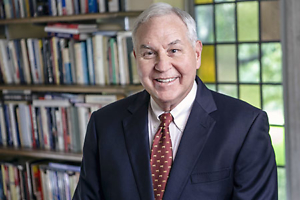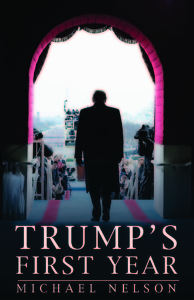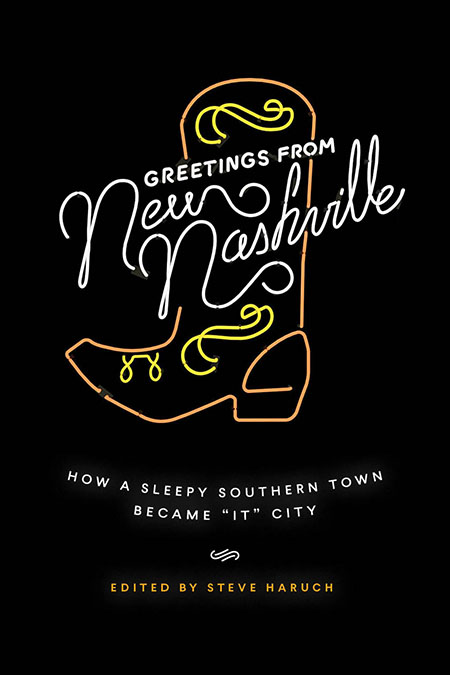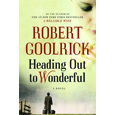American Carnage
A conservative expert on the presidency weighs in on Donald Trump’s first year
President Donald Trump has inspired great outrage among American liberals, as well as impassioned defenses from his core supporters. In Trump’s First Year, Michael Nelson, a distinguished conservative expert on the presidency, takes neither approach, offering dispassionate but trenchant critiques of Trump’s leadership during his first year in office.
 A former editor at Washington Monthly and a frequent contributor to the Claremont Review of Books, Nelson is the Fulmer Professor of Political Science at Rhodes College in Memphis and a Senior Fellow at the University of Virginia’s Miller Center. He is a prolific, award-winning author of books and articles on the American presidency, Southern politics, public policy, religion, and popular culture. He answered questions via email from Chapter 16.
A former editor at Washington Monthly and a frequent contributor to the Claremont Review of Books, Nelson is the Fulmer Professor of Political Science at Rhodes College in Memphis and a Senior Fellow at the University of Virginia’s Miller Center. He is a prolific, award-winning author of books and articles on the American presidency, Southern politics, public policy, religion, and popular culture. He answered questions via email from Chapter 16.
Chapter 16: In the past year, the news and opinion pages have been dominated by Donald Trump and his controversial presidency. What do we gain through a book-length analysis by a political scientist?
Michael Nelson: In part because of the news media’s all-Trump-all-the-time coverage, you could easily get the impression that Donald Trump is the entire government and that he’s completely unlike any other president in history. Certainly he is one of a kind in many ways, including his lack of any experience in public office before becoming president and his use of Twitter as his main form of communication. But like all of his predecessors, Trump is forced by the Constitution to share power with the other branches of the federal government, with the states and cities, and with the right of the media to criticize and of grassroots critics to organize. That’s the big picture that I’ve tried to convey in Trump’s First Year.
Chapter 16: In your view, did Trump squander the honeymoon period typically accorded incoming presidents?
Nelson: Yes, in part because he departed from more than two centuries of tradition and gave a dark, divisive Inaugural Address centered on “American carnage” instead of an inspiring and optimistic one. But blame must be shared with the Democrats, who decided from the outset to oppose him at every turn.
 Chapter 16: One of the core themes running through Trump’s First Year is the new president’s inability to adjust his leadership style to the national political system. What explains this disconnect?
Chapter 16: One of the core themes running through Trump’s First Year is the new president’s inability to adjust his leadership style to the national political system. What explains this disconnect?
Nelson: Trump is a seventy-year-old man who was successful in many ways before becoming president—not a formula for anyone to change their style. But unlike many business leaders, he never had to share power with an independent board of directors. Doing things his own way for so long left him unprepared for dealing with Congress, the courts, and other constitutional actors.
Chapter 16: From the standpoint of conservatives, to what legitimate successes can Trump point?
Nelson: Trump’s three major successes so far have all been conservative: his nomination of Neil Gorsuch to the Supreme Court and judicial conservatives to other federal courts, the tax bill, and the many less publicized decisions by the executive branch to roll back regulations on business imposed by the Obama administration.
Chapter 16: Trump’s public communications are a sharp break from previous presidents, both in style and tone. How have they affected his political performance?
Nelson: We never have to wonder what this president is thinking: his thoughts go straight to his right index finger and then directly into our phones via Twitter. It’s interesting that he is so much better at using catchy phrases to attack than to inspire. We all know about “Crooked Hillary” and “Fake News” but where are the positive catchphrases for healthcare reform or building infrastructure?
Chapter 16: The book’s final chapter is entitled “Prospects for Removal.” What factors will shape whether Trump lasts a four-year term?
Nelson: Evidence and, especially, politics. Depending on what evidence the special prosecutor uncovers and how the congressional elections turn out in November, Trump may or may not make it through the entire term without being impeached and removed.
Aram Goudsouzian chairs the history department at the University of Memphis. His most recent book is Down to the Crossroads: Civil Rights, Black Power, and the Meredith March Against Fear.






